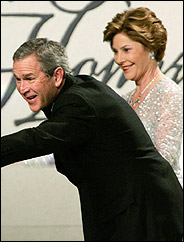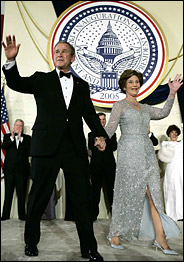Da The New York Times del 21/01/2005
Originale su http://www.nytimes.com/2005/01/21/national/nationalspecial2/21assess.h...
The President's Speech Focuses on Ideals, Not the Details
di Todd S. Purdum
 WASHINGTON, Jan. 20 - President Bush began his second term without uttering the words "Iraq," "Afghanistan," "Sept. 11" or "terrorism." But those omissions seemed to be precisely the point, allowing him to cast the crises and controversies of his first four years - and the ones he welcomes in the next - as a seamless struggle in defense of the nation's founding creed: freedom.
WASHINGTON, Jan. 20 - President Bush began his second term without uttering the words "Iraq," "Afghanistan," "Sept. 11" or "terrorism." But those omissions seemed to be precisely the point, allowing him to cast the crises and controversies of his first four years - and the ones he welcomes in the next - as a seamless struggle in defense of the nation's founding creed: freedom."The best hope for peace in our world is the expansion of freedom in all the world," Mr. Bush proclaimed, pledging himself to "the ultimate goal of ending tyranny in our world" in terms that deliberately echoed both Woodrow Wilson and John F. Kennedy, who summoned the world 44 years ago to ask "what together we can do for the freedom of man."
It is for historians to judge how well Mr. Bush's actions have fit, or may yet fulfill, his words. There remains a wide gulf between his eloquent aspirations and the realities on the ground, from Capitol Hill to the Middle East. Executing his ideas will not be easy, at home or abroad.
His tone was proud, unapologetic, even defiant, and his emphasis on foreign policy muffled his outline of the domestic agenda that he and his aides have said is so important to the success of his second term.
But his speech's very loftiness and its missionary zeal also amounted to a tacit acknowledgment that he believes that much of the world and perhaps many of his fellow citizens have misunderstood his actions in invading Iraq and threatening authoritarian governments in Iran and North Korea. He himself has not always described his motives in such idealistic terms, so the speech was a chance to hit the reset button.
"Today, America speaks anew to the peoples of the world," he said in a speech of barely 20 minutes that used the words "free" or "freedom" more than 25 times. "All who live in tyranny and hopelessness can know the United States will not ignore your oppression or excuse your oppressors. When you stand for your liberty, we will stand with you."
But stand how, and when, and where? When Mr. Bush warned that "the leaders of governments with long habits of control need to know to serve your people, you must learn to trust them," did he mean to endorse plebiscites in Saudi Arabia or Egypt that could produce anti-American governments? He invoked the view of the former Soviet dissident Natan Sharansky that rights "are secured by free dissent and the participation of the governed," but he did not spell out what that principle means for day-to-day relations with Russia, China or Pakistan.
Mr. Bush portrayed his domestic goals as a natural corollary of his belief in freedom. He described his vision of private investment accounts for Social Security as part of an effort to "widen the ownership of homes and businesses, retirement savings and health insurance, preparing our people for the challenges of life in a free society." He compared his ideas to past government programs like the Homestead Act, the G.I. Bill of Rights and the Social Security Act itself, and presented his plans - which critics have called an effort to unravel the New Deal - as a logical extension of Franklin D. Roosevelt's desire to "give our fellow Americans greater freedom from want and fear."
 But significant opposition in Congress and lukewarm support from the public for overhauling Social Security and the tax code make the prospects of success mixed. Even assuming that the first round of elections in Iraq proceeds as scheduled, the continuing insurgency there seems all but certain to preoccupy Mr. Bush for many months to come.
But significant opposition in Congress and lukewarm support from the public for overhauling Social Security and the tax code make the prospects of success mixed. Even assuming that the first round of elections in Iraq proceeds as scheduled, the continuing insurgency there seems all but certain to preoccupy Mr. Bush for many months to come.In short, there were plenty of reasons for Mr. Bush to avoid mentioning Saddam Hussein, Osama bin Laden and "the axis of evil" by name. The news in Iraq is hardly good enough to brag about, and relations with Iran and North Korea remain tense and seemingly stalemated. Mr. Bush referred only to unnamed enemies who "have unwisely chosen to test America's resolve."
It is not in Mr. Bush's nature to concede specific error. But it is Mr. Bush's pattern to adjust to changing practical circumstances and political realities, and he sought at times to strike a conciliatory tone. "The great objective of ending tyranny is the concentrated work of generations," he said. "The difficulty of the task is no excuse for avoiding it."
In an acknowledgment of the hard-fought election campaign - Senator John Kerry of Massachusetts sat on the inaugural platform, though not in the spot he had hoped to sit - Mr. Bush said: "We have known divisions, which must be healed to move forward in great purposes."
"Yet those divisions do not define America," he added. "We felt the unity and fellowship of our nation when freedom came under attack, and our response came like a single hand over a single heart. And we can feel that same unity and pride whenever America acts for good, and the victims of disaster are given hope, and the unjust encounter justice, and the captives are set free."
Mr. Bush, who campaigned four years ago with disdain for what he suggested was his predecessor's penchant for seeing foreign policy as social work, has set himself a tall order, and one for which a Democratic president might well be faulted.
James B. Steinberg, who was deputy national security adviser in the Clinton White House, said, "The objective is so sweeping that from here on in, every action of ours that falls short of this unequivocal commitment to freedom and to promoting the cause of freedom is going to be judged against the standard of 'You said you were going to do this.' "
Mr. Steinberg added, "It's also quite remarkable that one of the notions that's been so resisted by Republicans is the idea of a deep interdependence in the world, and now he's essentially adopted the notion that tyranny anywhere threatens freedom anywhere."
Mr. Bush has seldom shied from seeing the world, or himself, in black and white. His ways and means are debatable, but his sincerity is hard to doubt. He became governor of Texas and then president after an early adulthood marked by drift and too much drinking, a reality that never seems far from his mind.
"Self-government relies in the end," he said, "on the governing of the self." He cited "the truths of Sinai, the Sermon on the Mount, the words of the Koran and the varied faiths of our people" to proclaim that "Americans move forward in every generation by reaffirming all that is good and true that came before, ideals of justice that are the same yesterday, today and forever."
Sullo stesso argomento
Articoli in archivio
su Gulf News del 10/11/2006
su Gulf News del 03/11/2006
La OTAN reconoce haber matado a civiles en un bombardeo en Afganistán
Las autoridades afganas acusan a la Alianza de matar a 63 civiles por error
Las autoridades afganas acusan a la Alianza de matar a 63 civiles por error
su El Pais del 27/10/2006
News in archivio
su Amnesty International del 16/10/2006
su Corriere della Sera del 28/09/2006
su Panorama del 13/09/2006







